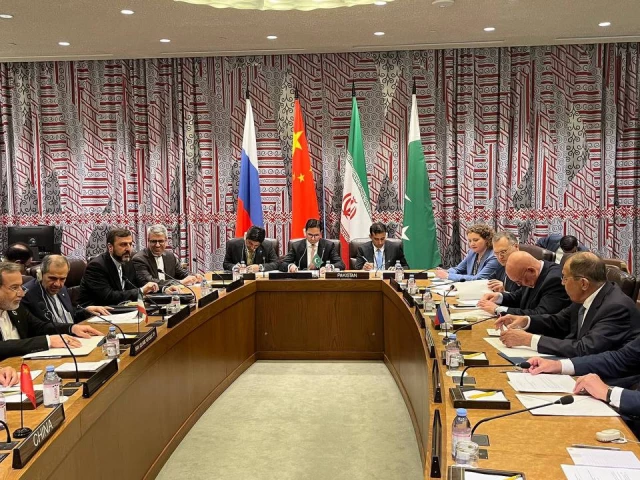Pakistan, China, Iran and Russia have expressed profound concerns concerning increasing security threats to Afghanistan, in particular the continuous presence of terrorist groups operating from Afghan soil and underlined the urgent need for regional cooperation to meet increasing instability.
The fourth quadripartite meeting of foreign ministers, convened on the sidelines of the 80th General Assembly of the United Nations, focused on the disastrous security situation, the ongoing humanitarian crisis and the country’s economic resumption.
In a joint declaration published at the end of the meeting, the four parties reiterated their support for the sovereignty of Afghanistan, calling on the nation to remain independent, united and free of threats to terrorism, war and drugs.
Countries have underlined the urgency of regional collaboration to stabilize Afghanistan, citing the significant risks posed by terrorist groups operating from Afghan soil.
Joint declaration of the fourth quadripartite meeting of foreign ministers from China, Iran, Pakistan and Russia, held on the sidelines of UNGA in New York on September 25, 2025. pic.twitter.com/fxgdgijtu
– Mohammad sadiq (@ambassadorsadiq) September 26, 2025
“The four parties expressed deep concern concerning the security situation linked to terrorism in Afghanistan,” noted the declaration, “in particular the continuous presence of terrorist groups such as ISIL, Al-Qaeda, Tehrik-I-Taliban Pakistan and the Islamic movement of Eastern Turkestan, among others.” These groups, the ministers said, represent a serious threat not only for Afghanistan but also for global security.
Representatives stressed the importance of effective measures against terrorism, urging Afghan authorities to fulfill their international obligations by focusing and eliminating terrorist groups.
“We call on the Afghan authorities to take effective, concrete and verifiable actions to combat terrorism,” said the press release, “in particular recruitment prevention, fundraising and access to weapons, and the dismantling of terrorist training camps on Afghan soil.”
In addition to security, the four parties discussed Afghanistan’s economic resumption, with a particular emphasis on the fight against the rise of synthetic drugs and the facilitation of the return of Afghan refugees. The ministers expressed their support for measures to reduce the cultivation of opium and fight against drug trafficking.
“The four parties congratulate the efforts of the Afghan authorities to reduce the cultivation of traditional opium,” noted the joint declaration, calling for complete measures to combat the production of methamphetamines and other synthetic drugs.
They also urged greater international support for Afghanistan, in particular in terms of humanitarian aid. “We call on the international community to intensify emergency humanitarian aid for the Afghan people,” said the statement, stressing the need to provide support without attached political conditions.
The four countries have reiterated the importance of an inclusive governance system in Afghanistan which reflects the needs of all ethnic and religious groups, with a particular emphasis on women’s rights insurance, employment and participation in public life. “Women’s access to education, economic opportunities and basic services is essential for the stability and prosperity of Afghanistan,” said the declaration.
Read: PM is a historical response to Indian aggression, calls peace and dialogue to the session of UNGA
NATO’s role in Afghanistan’s current fate was also discussed at the meeting, as ministers stressed that NATO members have the main responsibility for the current crisis and have urged them to raise sanctions against Afghanistan and make foreign assets in the country.
“NATO members should create opportunities for the economic recovery and economic development of Afghanistan,” they said, arguing for a holistic approach to the country’s reconstruction.
Foreign Ministers have also called for better cooperation against terrorism at bilateral and multilateral levels. They stressed that Afghanistan should be supported to take full measures to fight terrorism and prevent the use of its territory against its neighbors and beyond.
“The sovereignty, independence and territorial integrity of Afghanistan must be respected,” concluded the press release, opposing the restoration of the military bases in and around the country by those responsible for its current situation.
The meeting was an important step towards strengthening regional cooperation in Afghanistan, the ministers recognizing the current efforts of regional countries, in particular Pakistan and Iran, to accommodate millions of Afghan refugees. The four parties expressed their commitment to continuous collaboration to help Afghanistan recover from decades of conflict and instability.
In closing, the ministers expressed their support for diplomatic efforts to solve Afghanistan’s political problems. “We highlight the role of regional executives such as the Moscow format and the Shanghai cooperation organization in the facilitation of a political rules,” said the press release, welcoming recent discussions in Dushanbe, Tajikistan, and encouraging the continuation of quadrilateral consultations in the future of Afghanistan.




